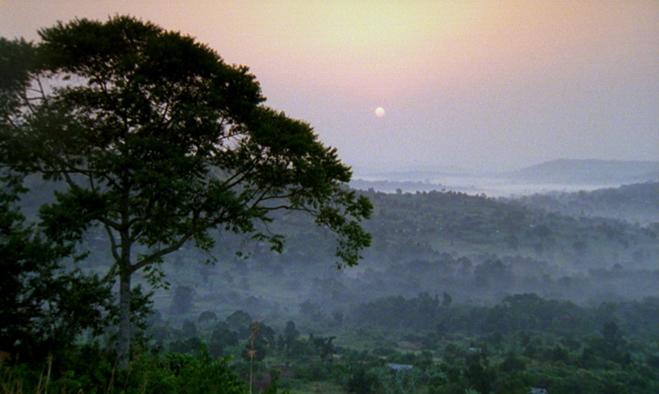
Zarina Bhimji, Out of Blue, 2002 © Zarina Bhimji / Bildupphovsrätt 2012
Moderna Museet Cinema
3.2 2012 – 22.4 2012
Malmö
The results of a devastating war are portrayed in Zarina Bhimji’s Out of Blue, without any immediate links to specific events. Similarly, the people we meet in Adrian Paci’s Turn On, whose daily chore in the film is to keep a lightbulb burning with the aid of a petrol engine, and the aggressiveness in Francis Alÿs’ El Gringo can be found all over the world. Anri Sala concludes our film programme with the moving Time after Time.
Zarina Bhimji, Out of Blue (2002), 3 Feb – 11 March
Adrian Paci, Turn On (2004), 13 March – 25 March
Francis Alÿs, El Gringo (2003), 27 March – 8 April
Anri Sala, Time after Time (2003), 10 April – 22 April
The film programme is organised by Joa Ljungberg and Andreas Nilsson. All the films are part of the Moderna Museet collection.
Zarina Bhimji: Out of Blue
We look out across an ominous and partly scorched expanse of land before following the camera at a meditative pace through deserted prisons and derelict public buildings. Despite being devoid of people, their lives have left traces, and we can hear voices that appear strangely disjointed from time and space. Out of Blue was shot in the artist’s native Uganda, where the dictator Idi Amin’s terror regime lasted between 1971 and 1979. The film reveals layers of emotional disturbances and traumatic remains in a way that mentally transports us also to other conflict-ridden areas, such as Kosovo and Rwanda.
The film is screened 3 February–11 March.
Duration: 24:25 min.
Adrian Paci: Turn on
A group of unemployed men sit on the stone steps next to a plaza in the Albanian town of Shkodër. Every morning, they go there in the hope of getting a job offer. This particular day, the artist Adrian Paci has paid them to each hold a light bulb plugged into a noisy generator. The flickering light of the bulbs can be read as a contradictory metaphor for the men’s vulnerable condition but also for their inner strength and spirit. In the twilight, the bulbs appear shining like stars against a dark sky.
Francis Alÿs: El Gringo
The film is screened 13 March-25 March.
Duration: 03:30 min.
Francis Alÿs was born in Belgium, but he lives and works in Mexico City since manyyears. El Gringo is set in the Mexican state of Hidalgo. In a violent and terrifying way Francis Alÿs illustrates how a stranger is received in a harsh and strongly territorialistic society. The apparently derelict settlement seems to have been taken over by wild dogs that ferociously defend their turf against trespassers. Issues such as xenophobia, the right to defend oneself and immigration are effectively visualised.
The film is screened 27 March-8 April.
Duration: 04:12 min.
Anri Sala: Time After Time
Time After Time by the Albanian artist Anri Sala is a moving existential contemplation. A scraggy horse is seen standing in a dangerously exposed and cramped space by the roadside. A car passes now and then, causing the horse to react with small movements. The focus comes and goes in the film, in time with our breathing. Time After Time can be seen as a time-image, where the storyline is subordinate to time itself. The film addresses our feelings rather than our intellect, and perception becomes a creative, personal act within each individual viewer.
The film is screened 10 April-22 April.
Duration: 05:22 min.
